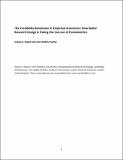The Credibility Revolution in Empirical Economics: How Better Research Design is Taking the Con out of Econometrics
Author(s)
Angrist, Joshua; Pischke, Jorn-Steffen
DownloadAngrist.pdf (560.5Kb)
OPEN_ACCESS_POLICY
Open Access Policy
Creative Commons Attribution-Noncommercial-Share Alike
Terms of use
Metadata
Show full item recordAbstract
Just over a quarter century ago, Edward Leamer (1983) reflected on the state of empirical work in economics. He urged empirical researchers to “take the con out of econometrics” and memorably observed (p. 37): “Hardly anyone takes data analysis seriously. Or perhaps more accurately, hardly anyone takes anyone else’s data analysis seriously.” Leamer was not alone; Hendry (1980), Sims (1980), and others writing at about the same time were similarly disparaging of empirical practice. Reading these commentaries, we wondered as late-1980s Ph.D. students about the prospects for a satisfying career doing applied work. Perhaps credible empirical work in economics is a pipe dream. Here we address the questions of whether the quality and the credibility of empirical work have increased since Leamer’s pessimistic assessment. Our views are necessarily colored by the areas of applied microeconomics in which we are active, but we look over the fence at other areas as well.
Date issued
2010Department
Massachusetts Institute of Technology. Department of EconomicsJournal
Journal of Economic Perspectives
Publisher
American Economic Association
Citation
Angrist, Joshua D. and Jorn-Steffen Pischke. "The Credibility Revolution in Empirical Economics: How Better Research Design is Taking the Con out of Econometrics." Journal of Economic Perspectives 24(2), Spring 2010, p.3-30.
Version: Author's final manuscript
ISSN
0895-3309